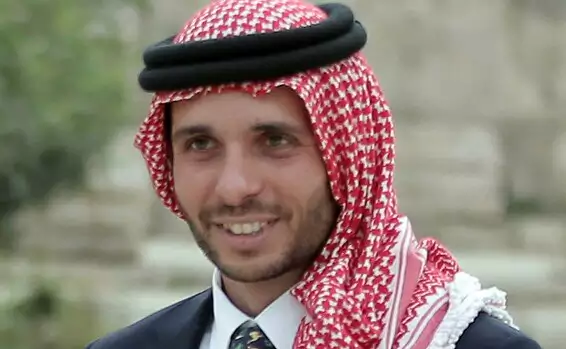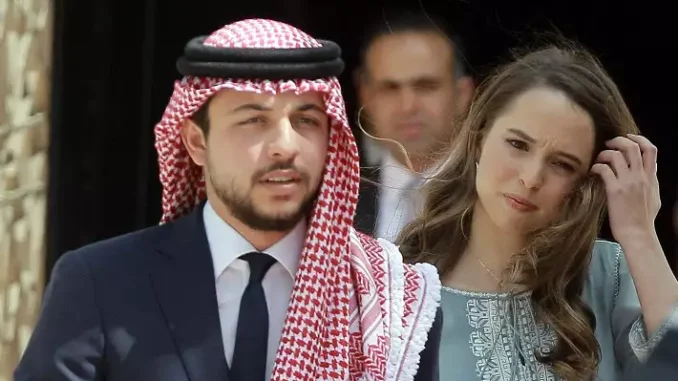T. Belman. Two days ago, Abedalelah Amaala tweeted
“Today, an American security delegation arrived quickly in Amman, and from the military airport immediately met with Prince Hussein II, the Viceroy, and discussed with him the peaceful transition or other matters, after it was categorically confirmed the death of King Abdullah II.”
This has been confirmed to me. Also that it signals the end of the Hashemite Kingdom.
As he approaches the age his father and grandfather passed away, King Abdullah II of Jordan is preparing his son, Hussein, to take his place. The problem is that if nothing changes, his son will receive a country in profound crisis.

King Abdullah of Jordan during a state ceremony in Amman, May 25 2020 | File photo: EPA via the Jordanian Hashemite Royal Court
King Abdullah of Jordan, 60, is all too familiar with his predecessors’ gloomy medical history. His father passed at the age of 63 after a struggle with cancer. His grandfather, Talal, also died when he was 63 after being overthrown and exiled, in addition to mental health issues with which he struggled.
Health problems have also befallen Abdullah, who flew to Germany on April 10 for spine surgery due to a herniated disc.
Although Abdullah doesn’t suffer from any serious disease, he is already preparing his son, Hussein, for the day he passes him the crown. While is father is recuperating in Germany, the 27-year-old crown prince has taken his place, and not for the first time. The prince leads prayers services in mosques, attends conferences, and even accompanied his father on his latest trip to Ramallah, where he met with Palestinian Authority President Mahmoud Abbas.
Like his father the king, Hussein was also educated in the West. He is a graduate of Georgetown University in Washington DC, and also a graduate of the Royal Military Academy Sandhurst in Great Britain. Hussein’s mother, Rania, is the daughter of a Palestinian family from Kuwait, originally from Tulkarm in Judea and Samaria. When the day comes, Hussein will become the first “Palestinian king of Jordan.”
The burden of refugees
What type of kingdom will Abdullah bequeath his son? Since the outbreak of the wars in Iraq and Syria, Jordan has been buckling under the weight of refugees. According to the United Nations, from 2018 to the end of 2021, only 41,000 Syrian refugees had returned home – just 5% of all Syrian refugees in Jordan. Most are afraid of returning because of ongoing fighting, a lack of jobs, and the possibility they will be drafted by Assad’s army.
The kingdom is currently hosting some 760,000 refugees, mostly from Syria and Iraq and the rest from Yemen, Sudan, and other countries. Moreover, the government believes the actual number could be upwards of 1.3 million Syrian refugees in Jordan, as many of them aren’t officially registered.

Another headache pertains to the Palestinian population. Some 2.1 million Palestinians are registered as refugees in Jordan, and to this day 10 refugee camps house hundreds of thousands of Palestinians. These camps are one of the sources of hostility toward Israel, which recently erupted anew over popular opposition to the countries’ electricity-for-water agreement.
Additionally, the camps are fertile ground for the Muslim Brotherhood movement. Earlier this month, the movement organized a conference to mark “Land Day” and the 1968 Battle of Karameh that took place north of the capital Amman. “The Jordanian people are a true partner of the Palestinian people in their fight for liberation. The armies for the liberation of Palestine will emerge from Jordan, and just as Palestinian and Jordanian blood intertwined in Karameh – it will intertwine again in the battle we will lead to liberate Al-Aqsa,” declared a senior Muslim Brotherhood cleric in Jordan.
Even the royal family is under threat. Prince Hamza bin Hussein recently relinquished his princely title in apparent protest over how the country is run. It was the latest chapter in an ongoing palace feud that saw the junior royal placed under house arrest a year ago.
Prince Hamza, who had lost the title of crown prince in 2004, posted the announcement on his official Twitter account. He wrote that he was driven to the decision because his convictions cannot be reconciled with the “current approaches, policies and methods of our institutions.”
He stopped short of directly criticizing King Abdullah and the ruling elites, as he had done in the past, but his tone signaled that the rift has not been mended, as the Royal Court suggested in the past.

As early as 2012, Hamza was hailed by protesters. Those protests were fuelled, among other things, by the opposition of Jordanian tribes to gas subsidy cuts. The economic crisis in 2018 again thrust Hamza center stage, when he met with tribal leaders and criticized the government.
Reuters reported that his house arrest last year was apparently ordered after he paid a condolence visit to relatives of COVID patients who died due to a lack of oxygen supplies at the hospital. Officials in Jordan said the visit was the “straw that broke the camel’s back,” as Hamza had apparently arrived in the city of Al-Salt several hours after the king had visited the hospital in question, and several days before the king was expected to visit with the bereaved families. This move, the officials said, was viewed as subversive.
Citizen Hamza, however, won’t lack political opportunities to exploit in the future. Just last month, Jordan’s security services arrested dozens of activists who had organized a demonstration in Amman.
Their demonstration was held on March 24, the date considered by many to be the beginning of the Arab Spring in Jordan. Although the rally was dispersed by force, it likely won’t be the last of its kind.
Will he continue on his path?
It seems King Abdullah is choosing to handle the threats facing him both aggressively and precisely. He is neutralizing his brother and jailing his detractors. The question is whether his son will continue on his path, which leads to violent confrontation similar to the civil war in Syria, or decide to implement governmental reforms.



Leave a Reply
You must be logged in to post a comment.